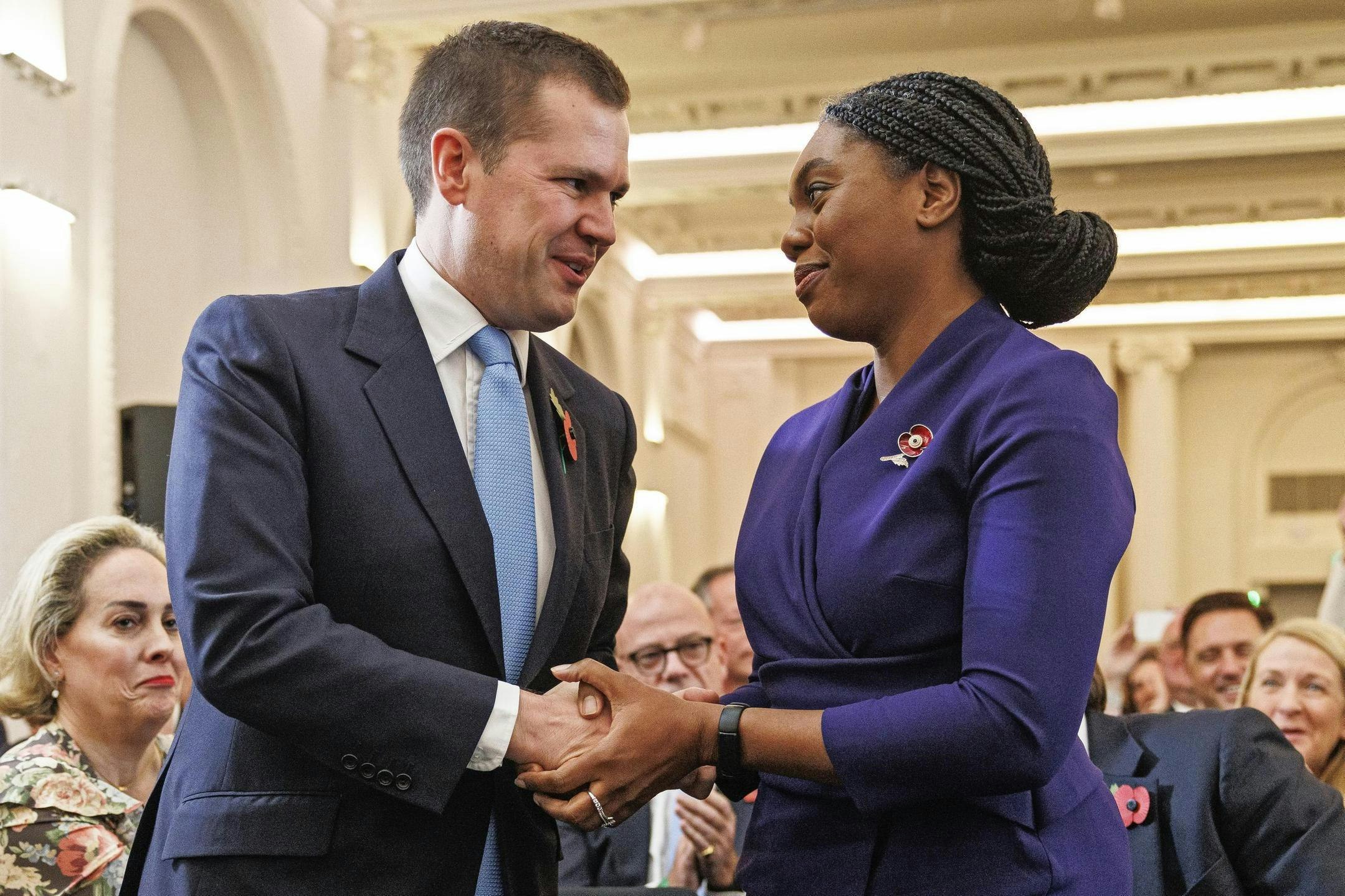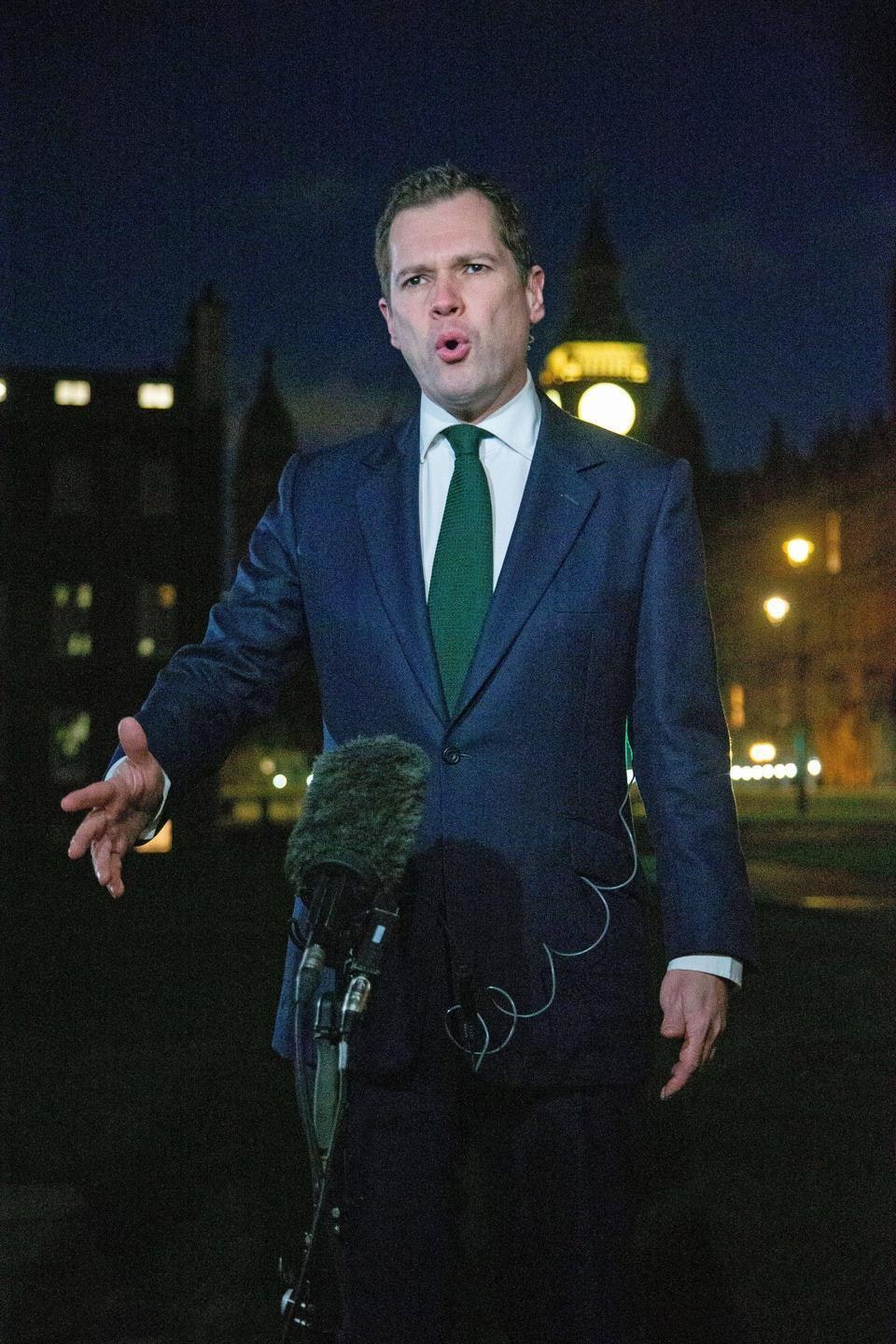This article is taken from the May 2025 issue of The Critic. To get the full magazine why not subscribe? Right now we’re offering five issues for just £10.
Rob Jenrick would not want this piece to be written. He has been unhappy whilst serving under Kemi Badenoch, but he is being professional. Indeed, this professionalism is at the heart of our case for him, which we make below. However, whilst we both campaigned for Rob to be leader, we — and he — would ordinarily believe that losers ought to give their consent to the winner. So what’s different this time? Why not give our current leader a fair crack of the whip? In a name, Nigel Farage.
The Tory Party has not come to terms with its defeat last year, nor with the 14 years which preceded it. To be on any MPs’ WhatsApp group is to see this, if not exactly daily, then at every opportunity colleagues get. Come that once-in-a-blue-moon poll where we’re in first place, such is the joy! Yet who realistically can disagree with the sneerers who send us our habitual low twenties tallies with a cawing, “strong third place!”? We are in massive trouble and are not solving our problems because we’re not admitting to them. We are our problem, and the voters see that even if we do not.
Perversely this is exactly why Rob Jenrick gets it. He was everything that was wrong: a Remainer who went along with Boris and his fair-weather acolytes even whilst their performance slid from farce to tragedy. The “Generic” snark spoke to a smarmy manner, and he failed in office, coming a cropper over issues he couldn’t sell and which we didn’t solve.

An unsuccessful housing secretary is an odd choice as saviour of a party that comprehensively failed to match policies it designed to create a population explosion with the housing supply it required. And yet, he is the man.
To start with, he is aware of his own flaws and has worked very hard to remedy them. The contrast with our current leader’s impregnable self-belief is stark. But the reason we believe the party must change its leader is because she can’t get better. Whilst Farage can. Those, including the editor of this magazine, who believe that Reform’s leader imposes a “lead ceiling” on their potential support [“The man who poisons the well”, April 2025], are wrong. The analysis that Tory failure drove support to Reform is correct: the mistake is to think that more of the same can’t drive yet more natural Tories their way.
Kemi can’t
We fear some Critic readers won’t like this, but culture isn’t the answer, politically. It is, however, the one you get most often from MPs sincerely loyal to Kemi Badenoch and from her staffers. “Cultural issues” are what will turn the tide, you are privately told in response to the latest dismal performance at PMQs or yet another stagnant poll. This may explain why she appears to latch onto whatever cultural outrage she sees on her phone.
This is what interests her and is what her supporters think will make the difference. It’s a conscious strategy, genuinely held. But tweets are less important than economics. It is a mistake that replicates the tactical ineptness of Remainers during the Brexit referendum. They did not appreciate how small “c” conservative-minded people felt they were losing out. This is because — unlike Thatcher in the past and Farage in the present — they have no sense of who these people are.
The personal criticisms of Badenoch — the laziness, rudeness and inability to think on her feet — are not exactly beside the point. She could work on these, bar the last. But they’re unfair in that she’s, in our view, unpopular and dislikeable and demonstrably no sort of electoral asset to the party, chiefly because she embodies the “we broke it! who better to fix it?” entitlement that afflicts too many Conservative politicians.
In other words, Badenoch is not so much dragging the party down, as she’s where a party gets to when it reaches rock bottom. Hague, Duncan Smith, Badenoch were all very different people but aspects of the same problem. Exhausted parties turn to leaders who provide self-comfort about the mess they’re in, rather than tackle how they got there.
Not coincidentally, just as David Cameron was the answer to questions the party was refusing to ask 20 years ago, Rob Jenrick is the leader needed now.
Jenrickworld
What would it look like had Robert Jenrick been elected Tory leader last November? His energy and hunger are obvious. Charging up and down the country, investigating dilapidated multicultural parts of provincial cities to point in disgust at the sheer amount of rubbish and litter on the ground, hounding the Prime Minister for surrendering the Chagos Islands to a distant country with a manufactured claim to them and charging after the justice secretary, throwing bricks through rhetorical Overton windows to do so, making the once verboten charge that Starmer’s Labour are overseeing “two-tier” justice. The sight of Jenrick in his puffer jacket strikes fear into the heart of impotent Labour ministers.
If he were in charge at Conservative Campaign Headquarters, things could be very different. Not least because he would be professionally polite towards those working for him.
Other visions of Jenrickworld emerge. Flesh going onto the policy skeleton with speed. Not simply a declaration that net zero is quite difficult but an announcement that it is an act of economic sabotage, a commitment to overturn it and all its associated ills — from ULEZ to low traffic neighbourhoods to the electric vehicle mandates — and a committed campaign targeting the unhinged zealotry of the energy minister, Ed Miliband.
We might have a shadow chancellor who gets out of bed to attack a Chancellor of the Exchequer overseeing taxes unseen in peacetime and a policy of expropriation of family businesses and farms more commonly associated with Robert Mugabe or Julius Malema. We might have got a vigorous response to the Spring Statement, with a vision of lower taxes and lower spending, rather than the drone of Mel Stride who gives the impression his whole purpose in being a Tory MP is to be a Tory MP.
Instead of policy “commissions” which look like they will be a process where the leader’s team asks colleagues — and activists, if they’re feeling brave — for some ideas which will be promptly ignored, we might have a nascent Project 2029 in the works.
Taking back control of Britain’s laws by leaving the ECHR, deporting hundreds of thousands of illegal immigrants after years of ignoring the issue in the hope it would just go away (and not be nabbed by someone like Rupert Lowe, who should always have been a shire Tory backbencher) and putting activist judges back in their boxes once and for all with the smack of Parliament reminding them that they interpret, rather than create the law.
This is not “writing a manifesto” years before a general election. It is the meat and drink of politics. This is articulating a vision and a direction of travel and, most importantly, striking a flailing government in its soft lawyerly underbelly. And it’s imperative to do this precisely because there’s a fizzing populist party to the Tories’ right sitting alongside them in the Commons.
Reform throws ideas around in all directions. These may not all be serious or, to use that cursed technocratic word, credible, but they are confidently projected by Farage, the politician currently making most of the political weather.
In Jenrickworld the Tories may have a shadow cabinet that is not full of former ministers responsible for the ills of the age. They certainly would not have a shadow foreign secretary (Priti Patel) utterly unapologetic for her disastrous opening of the floodgates, with record-breaking immigration not just once in 2020 with the new, allegedly “skilled” visa route but again in 2021 with the health and care visa, a pathway for scammers, fraudulent nurses and carers and hosts of fiscally-burdensome dependents.
A Jenrickian parliamentary party is not traipsing out of Parliament early every day, leaving Labour’s agenda barely challenged. Instead, they would be harrying ministers, leaving them bamboozled and exhausted. Humble addresses are demanded, landmines are laid in the order paper and votes called at every possible opportunity: programme motions, ten-minute rule bills, every minute the Speaker gives is contested.

At every turn, clueless Labour MPs are forced in and out of division lobbies whilst their inboxes grow fuller and fuller, groaning under the weight of unanswered letters about cuts to benefits and tax rises. The government’s MPs shuffle around like zombies. They may have a handsome majority, but their souls are tired, beaten down by the guerilla tactics of a politically astute Tory Party.
It isn’t all plain sailing in Jenrickworld, however. Most of his MPs are fearful of his Blue Faragism, and some of his oldest friends are contemptuous of him for advocating it. Whispers of resignations or letters occasionally zip around the tea room after the latest video from the Leader of the Opposition is posted online, where he and his youthful team highlight the disasters of immigration by walking around Whitechapel, pointing at things.
Some think he may repeat Boris’s whip-removal gambit of 2019, taking the Tory parliamentary party down to only 110, perhaps 105 MPs. After all, they aren’t winning any votes as it is. The leader’s praetorian guard urge him to do so, on the same day he announces his plan to cancel foreign aid to Pakistan on his first day after winning office. Tory MPs look over their shoulders nervously at Ed Davey and wonder what it would be like to represent a seat with as many Waitroses as the Lib Dems command.
Can it be done?
This then is our fantasy: a leader with a work ethic punching Labour until it notices, which is roughly six months before the public will do so. With Farage, he fights fire with fire. Reform’s ceiling is much higher than most Tories think. It takes a Tory MP who is not from its traditional right wing to see this, which is just more proof of a political professional at work. Rob Jenrick has the zealotry of a convert, which is a credit to the skill with which he is inhabiting his role as a born-again radical.
Even the scale of Jenrick’s revisionism impresses. Few things are funkier inside the Tory party than scepticism about Atlanticism. In truth, few things are more implausible than Rob — a youthful cheerleader for Hillary Clinton no less — being an enthusiast for a post-American world. But just as he has sniffed the air inside the party and is saying what needs to be said domestically, Jenrick’s embrace of foreign policy realism is part of a Farage-beating package Kemi Badenoch is seemingly incapable of understanding, let alone championing.
He has three tests: one, do what Badenoch won’t, and resist the false — and above all else, unpopular — idol of Trump. The Donald just won’t fly here: don’t be self-indulgent and odd about this. Two: appoint, and listen to, the people she won’t. More Simon Clarke at Onward, much less Dean Godson at Policy Exchange. Give Matthew Elliott, this country’s single most successful organiser on the right this century, a big job and let him do it. Three, remember that your real target is Farage.
Wanting your party to survive is a legitimate goal, especially if you’re in that party because you believe in it rather than in what it can do for you. We need to turn to the right if we want to stay the party of the right. This is what Rob Jenrick is doing.
His one weakness is that he wants her to lead the party, for now. Calculating that Badenoch will have to do the dirty work and lose anyway is legitimate politics. Our case for Rob turns on him having less time than he thinks he does. He should want to lead the Tory party whilst there’s still a Tory party to lead.







